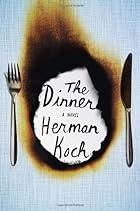 Set in the Netherlands, this is not a book about food, but it is a book that highlights human kind's historical rite of gathering around a meal to enhance personal relationships. Presented in a series of chapters based on the courses of a formal dinner at a posh restaurant, the story concerns the families of two brothers who obviously have deep seated unresolved sibling jealousies. Their wives and sons are central characters to the unfolding tale. Each group has its own set of rivalries and problems.
Set in the Netherlands, this is not a book about food, but it is a book that highlights human kind's historical rite of gathering around a meal to enhance personal relationships. Presented in a series of chapters based on the courses of a formal dinner at a posh restaurant, the story concerns the families of two brothers who obviously have deep seated unresolved sibling jealousies. Their wives and sons are central characters to the unfolding tale. Each group has its own set of rivalries and problems.While the story is framed as a chronicle of family rivalries, it is much more: a dark tale of ethical dilemnas unearthed as each course is served, as the brothers and their wives make and receive cell phone calls, while outside, uninvited off-spring are running loose on the unsuspecting populace.
Briefly, without spoilers, the story is told by the younger brother Paul, who along with his wife Clare, does not want to be at this dinner. He resents his older brother Serge - a successful politician who is poised to become the next prime minister. He feels Serge's son is the one responsible for all the trouble that nobody wants to talk about. He resents Serge's success and notoriety, his pushing for this posh restaurant to show off, rather than going to a simple coffee-shop that he and Clare would have preferred. Paul especially detests the sycophantic staff and their fawning over his brother. Serge's wife Babette is alternately annoying, insightful, and cloying-- a thoroughly nasty piece of work. The brothers are both aware of criminal activity on the part of their sons, but neither wants to admit to their suspicions. The dance around the unspoken truth permeates the entire dinner.
How they negotiate the choices each parent faces as they try to view themselves as moral beings, as they think about their futures and the impact their choices will have on their individual families, the extended family, and ultimately even the country is a tightly drawn narrative. By limiting the structure to a single dinner, and by having the agony of making menu choices and dealing with officious waiters a way of drawing out the dinner long enough to provide some space for back fill, the author has written an incredibly complex story in the guise of a simple tale of a dinner with its menu and accompanying conversation.
This is a book to be read again, and discussed with a group. The many choices of both the characters and the author in how he chose to portray those characters is a tour-de-force.They are nasty, scary and altogether unlikable. Koch's ability to string the reader along this slippery slope is a tribute to his writing skills. This is definitely one of my nominees for the best of the year. The translation from the Dutch is superb.
Go find it. Read it. Schedule it for your book group.
Title: The Dinner
Author: Herman Koch, translated from the Dutch by Sam Garrett
Publisher: Hogarth (2013), Edition: 1ST, Hardcover, 304 pages
Genre: Literary fiction, social satire
Subject: family relations, moral decisions
Setting: Netherlands
Source: Review copy from publisher
Why did I read this book now? It's being considered for the long list for the 2014 Maine Reader's Choice Award for literary fiction.







I'm not sure I'd like it if all the characters are "nasty, scary, and altogether unlikable" - but your review is so great that I should at least try.
ReplyDelete